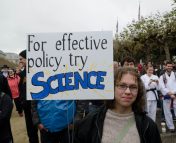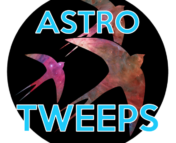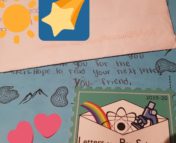Author’s Note: I’m in graduate school in the US so most of my experiences come from a US-based perspective.
The phrase “Hi, we know each other from the internet!” might have been something weird to say a decade ago, but now it’s one of my favorite icebreakers for meeting people in astronomy. The first time someone said this to me, I felt a wave of joy and excitement, realizing that I had made a real connection through my time on Twitter. Olivia (@livwithoutlimit, an astrochemist and science artist) and I mutually followed each other on Twitter, supporting each other as women who make zines and other art about astronomy and science. When I was visiting her institution, she showed up to my talk and introduced herself, with pretty much that exact sentence the friendship was made!
I’ve now done the same thing to multiple people at conferences, and personally, social media has helped me feel like, despite the geographic separation, there’s a really strong, interconnected community in astronomy (and I’m a part of it – take that, impostor syndrome!). I learn about science news, get inspired by other scientists, and meet new people, all on Twitter. That leads us to today’s Astrobite – what’s the role of social media in a modern astronomer’s career? What can you use it for, how can you get started, and what are the “rules” for it? We’ll be focusing on Twitter, which has a vibrant community of astronomers, by exploring tips, tricks, and experiences from many different folks in the community.
Why use Twitter as a scientist?
From a few informal Twitter polls I posted, a majority of astronomers on Twitter primarily use it to make connections in the field and find community. A large fraction also use it for science communication and outreach (#scicomm), for keeping up with news in the field and updates from conferences, or for other professional development, like mentoring.
#1 – Community Support / Networking
When asked to share their experiences on Twitter, astronomers overwhelmingly responded with encouraging stories about times that someone helped them prepare for an interview, congratulated them on an accomplishment, or became a collaborator because of discussions on the site.
Half of poll respondents say that Twitter has definitely positively affected their careers, and a third have formed a collaboration from their online interactions. A number of inventive projects started from these sort of connections, such as the Astro2020 white paper on gender that was organized entirely online according to @toomanyspectra. Twitter enables a flow of ideas between scientists who may not otherwise get to interact, and hearing about other people’s work and open questions is a great way to get inspired. Many people shared experiences of collaborations formed on Twitter, such as @spacescisteph connecting with the New Horizons team to share expertise on an instrument used to observe distant Kuiper Belt Objects, and @BenneHolwerda and @PBarmby making a connection to work on a project about “galaxies of unusual size” that started as a tribute to Vera Rubin.
With all these scientists in one place, it’s also a great place to ask questions and get expert answers. @ethan_kruse appreciates the quick access to experts when working on research problems. “Have a question about something weird in your TESS data, or wondering if a tool exists to do something? Plugging into [the astronomy Twitter network] gives you a good idea of who to ask for quick answers.”
Expertise isn’t only about science, here, either – with astronomers at all career levels, it’s a great place to hear about job openings, or give/get advice on transitions between career stages, such as grad school and postdoc applications. Academia and the job market are often mystifying, so having other people help you navigate the process can make all the difference. For example, @hilary_egan says she heard about a job on Twitter, Other astronomers also often seem eager to help, showing the caring community that’s been created in this space. @astrohannahf shared a story of working on her grad school applications (a notoriously stressful process), and how @leahmfulmer, a grad student at the University of Washington, replied to her tweet and offered to help with interview prep, even doing practice interviews with her via Skype. She says, reflecting on this meaningful support, saying “it helped me relax a bit and made my actual interviews much less stressful. We had never met in life, she was just a part of the astronomy twitter community that I found here! She’s the best! I appreciated it so much. In general, I feel like the Astro community on Twitter is wonderful and just endlessly supportive.”
This supportive community has created space for folks of all career stages to share their successes (and failures) publicly, bonding over the experience of the highs and lows of science. It’s become a place that normalizes failure as part of the process (which is much needed, since so much of research requires failing and trying again!), promotes work-life balance and self-care, and celebrates the success of everyone in the field. @emilylurice mentioned how she uses Twitter for mentoring by promoting her students by advertising their presentations at conferences, recruiting new students, and also remotely encouraging junior scientists. Personally, I was so excited when I submitted my first paper, and the response from posting about it on Twitter made me feel so valued and included in the field.
Also, seeing others share openly and honestly about mental health in grad school, ask questions about how academia works, challenge problematic traditions in the field, and more has made a difference in my experience in the field, especially as a first generation student. If things aren’t going well, it’s also helpful to share failures and struggles on Twitter, since people often respond positively that they can relate; other people can help validate these feelings through the ups and downs of academia, and remind people that they’re not alone in this. There are a lot of great advocates for reducing the stigma surrounding mental health and promoting self-care especially in grad school, such as @hwahl16 and @phd_balance. This emphasis on creating a nurturing and welcoming atmosphere has an effect on our entire community, both on and offline, and it all starts with single interactions. @aibhleog recounts how at the recent AAS meeting, someone made sure to find her to show appreciation for her outreach efforts on Twitter. These comments and supportive messages can make someone’s day, or even encourage them to continue in science.
These connections don’t have to stay on the internet, either. Mentioning “I think we follow each other on Twitter!” has become one of the best icebreakers for conferences, and has led to many lasting connections and in-person meet-ups.
#2 – Science Communication & Outreach
One great aspect about social media is that it’s free and available to the entire public across the world. Understandably, that makes it a great platform for outreach! Many large organizations, such as observatories and NASA missions, have official accounts where they post mission updates and exciting results. However, you don’t have to be part of a major group to share science on Twitter! Any time you retweet cool science content, you’re contributing to science communication. You can also contribute your own content, like threads explaining interesting topics, new visualizations or animations, and science art. People are very specialized in their specific subfields of astronomy, so you can learn a lot from threads about someone’s research topic, as explained by the expert on it! If you’re looking for people to follow, some of my favorites are @starstrickensf and @astropartigirl for informative and exciting threads, @gaiusdivifilius and @physicsj for info on data visualizations, and @jtuttlekeane and @startorialist for science art/fashion. Bonus: Startorialist links to lots of other cool artists, so if you read their Tweets, you’ll find even more people to follow!
The power of hashtags is also important in science communication on social media. These handy tags help people sort through information on Twitter and follow certain topics. For example, @astroposses, @safreitas_c, and @geisa_ponte have created two campaigns in Brazil: #AstroThreadBR and #AstroMiniBR. They have a group of astronomers who tweet regularly using these hashtags, and after a year of consistent use, people recognize these as trustworthy sources of science news and information.
#3 – Keeping Up with Science News & Conferences
Many conferences now have hashtags, so people who aren’t able to attend in person can still follow along with tweets about the event and hear about people’s new research. Tweeting at conferences has grown in popularity, with many exhibitors and presenters sharing their account handles on their giveaways and talk slides or posters. @astromeetings also posts which conferences are happening each week and their corresponding hashtags, which can be useful for following along live tweets of meetings!
Twitter is also useful for hearing about new papers and research coming out, especially papers posted on the arXiv. Scientists often share when their work is finally published or publicly available, and some even post more accessible summaries of the main points of their work in Twitter threads. (This ties into the community aspect, too – submitting/publishing a paper is a great accomplishment, and it’s really fun to virtually celebrate this and other achievements! #sciencedancing)
Other events and breaking news often make their way onto Twitter, since people publicly discuss the newest and most exciting events, from solar eclipses to rocket launches to LIGO/Virgo events and beyond. @lcagee says “Twitter is my go-to source of information for solar flares, aurora info, meteor shower info, earthquake and tsunami info in real time. Also launch info. It’s like having a field reporter in every location on Earth. If it’s happening, people will post.” Recently, there’s been a lot of talk about Betelgeuse; @NGC3314 notes how “lots of interesting information from actual red-supergiant specialists went around on Twitter” regarding the dimming of this nearby star.
So, how do I get started? What are the rules?
It’s straightforward to get involved in this online community – just make an account, and start following people! If there’s anyone at your institution that’s on Twitter, follow them, and it’s also a good idea to look for official accounts related to your interests (such as accounts for NASA missions like TESS, observatories like ALMA, or professional organizations like the AAS).
A large majority of the folks who responded to our poll say that they follow scientists to learn about science and get the latest news (sometimes in the form of science memes). If you’re interested particularly in the #scicomm aspect of social media, we’ve collected some tips from experienced science communicators on Twitter, such as @readmorescience, @thiagosgbr, and @danielandjorge:
- Use hashtags – they help people find your posts!
- Follow back smaller (<1,000 followers) accounts, not just well-established (10k+ followers) accounts. It helps you meet new people, and get newer folks started in the community.
- Interaction is key in engaging people, and expands your reach in the long run.
- Always be friendly and respectful of others.
- Follow other people who are using Twitter for outreach – you’ll likely learn a lot of cool facts, see stunning visualizations, and get inspired on how to do more #scicomm yourself!
@astrobetter has also written a series of posts on Twitter etiquette at conferences, and @jenheemstra wrote “A Scientist’s Guide to Social Media” that may help answer some questions about the nuts and bolts. And if you’re still not convinced Twitter is a useful tool for scientists, Scientific American has a whole series of articles on Social Media for Scientists!
Although it may not be for everyone, social media can be a useful tool to create positive change in our field, to find community (especially during grad school, which is known to be challenging for mental health), to spread the word about the science we do, and more. Though negative comments and other bad experiences can definitely happen on the internet, overall, academic Twitter is a safe place to share ideas. I have made connections that would never have been possible without the presence of social media – so come say hello, and follow me on Twitter @briles_34!
Thank you so much to all the people who participated in discussions on Twitter and shared their experiences for this article!




